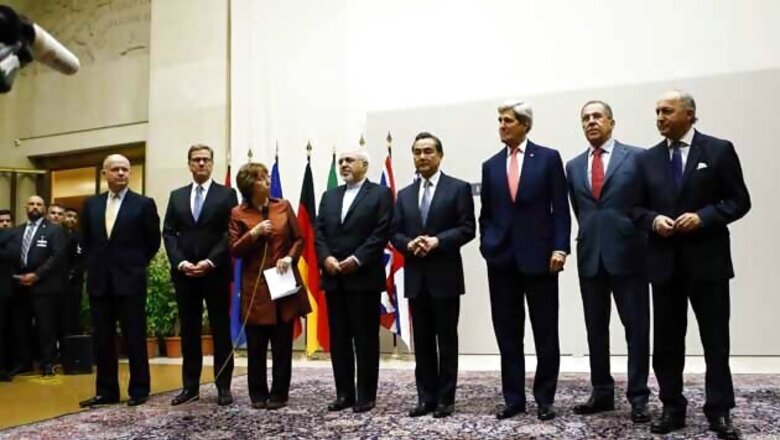
views
Israeli Prime Minister Benjamin Netanyahu's government denounced world powers' nuclear agreement with Iran on Sunday as a "bad deal" to which Israel would not be bound.
Yet Israeli officials stopped short of explicitly threatening military action that could further isolate the Jewish state and imperil its alliance with Washington, saying more time was needed to assess the accord.
"This is a bad deal. It grants Iran exactly what it wanted - both a significant easing in sanctions and preservation of the most significant parts of its nuclear programme," an official in Netanyahu's office said.
"The economic pressure on Iran could have brought about a much better deal which would have dismantled Iran's nuclear capabilities."
Aimed at ending a dangerous standoff, the agreement between Iran and the United States, France, Germany, Britain, China and Russia was nailed down after more than four days of negotiations in the Swiss city of Geneva.
The West and Israel fear that Iran has been seeking to develop a nuclear weapons capability. Tehran denies this, saying its nuclear programme is a peaceful energy project.
The United States said the agreement halted progress on Iran's nuclear programme, including construction of the Arak research reactor, which is of special concern for the West as it can yield potential bomb material.
It would neutralise Iran's stockpile of uranium refined to a fissile concentration of 20 percent, which is a close step away from the level needed for weapons, and calls for intrusive UN nuclear inspections, a senior US official said.
The Islamic Republic has also committed to stop uranium enrichment above a fissile purity of 5 percent, a US fact sheet said. {ID:nL2N0J907M]
But that still appeared to fall far short of Netanyahu's demand for a total rollback of the Iranian nuclear programme.
"You stand and shout out until you're blue in the face, and you try to understand why they're not listening. The world wanted an agreement," Finance Minister Yair Lapid, a member of Netanyahu's security cabinet, told Israel's Army Radio.
"GOD'S IN THE DETAILS"
"We also said that a diplomatic accord would be good. A diplomatic accord is certainly better than war, a diplomatic accord is better than a situation of permanent confrontation - just not this agreement," Lapid added.
He said Israel had to pore over the deal: "For example, we still don't understand exactly what stepping up the monitoring (on Iran's facilities) means. This is a detailed matter. God really is in the small details."
In Washington, a senior US official said President Barack Obama would discuss Israel's misgivings with Netanyahu on Sunday.
"Ultimately we understand and appreciate how Israel is particularly sceptical about Iran. Given the threats that have been made about Israel from Tehran we understand why Israel will want to make sure that this is the best deal possible," the official said.
"I would say that what we have now is a six-month period to test whether the new leadership in Iran continues to follow through their commitment to move Iran on a new path. What we will know after six months is whether there can be a solution."
Israeli Economic Minister Naftali Bennett, another security cabinet member, said the Netanyahu government could act unilaterally.
"Israel does not see itself as bound by this bad, this very bad agreement that has been signed," Bennett told Army Radio in a separate interview. "If the State of Israel sees that Iran is endangering it, the State of Israel is permitted to defend itself and is capable of defending itself."
But he hedged when asked whether Israel might attack Iran even as Western allies tried to hammer down a permanent nuclear deal in the coming months, saying: "Israel is not keen to jump ahead on this matter. The nuclear problem is the whole world's problem."
Widely assumed to have the Middle East's sole atomic arsenal, Israel sees a nuclear-armed Iran as a mortal danger and has long issued veiled threats to launch a preemptive war against its arch-foe.
Israeli Foreign Minister Avigdor Lieberman said the Geneva deal was Iran's "greatest diplomatic triumph" since its 1979 Islamic revolution, and predicted an arms race could result among Sunni Arabs who also feel wary of the Persian Shi'ites.
The Netanyahu government has therefore to conducted a strategic review of its options, Lieberman told Israel Radio.
He played down any rift with the United States, which led the Geneva talks. Asked if he felt betrayed by Israel's most important ally, Lieberman said: "Heaven forbid."



















Comments
0 comment